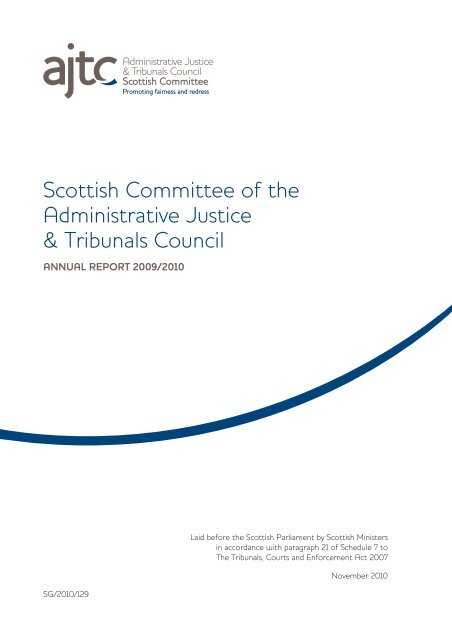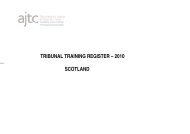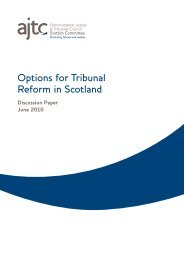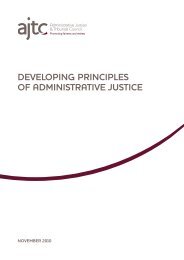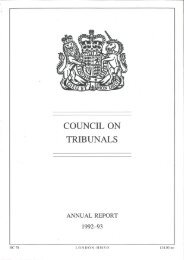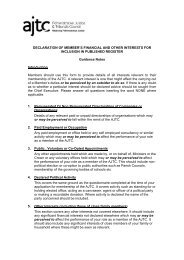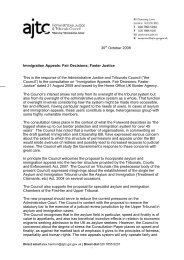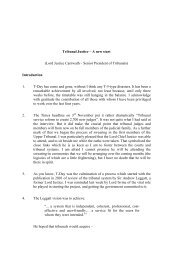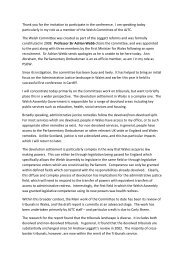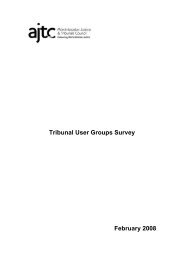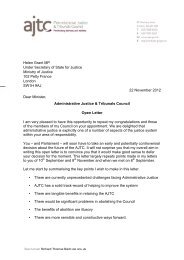PDF 0.56mb - Administrative Justice & Tribunals Council - Ministry of ...
PDF 0.56mb - Administrative Justice & Tribunals Council - Ministry of ...
PDF 0.56mb - Administrative Justice & Tribunals Council - Ministry of ...
You also want an ePaper? Increase the reach of your titles
YUMPU automatically turns print PDFs into web optimized ePapers that Google loves.
Scottish Committee <strong>of</strong> the<br />
<strong>Administrative</strong> <strong>Justice</strong><br />
& <strong>Tribunals</strong> <strong>Council</strong><br />
ANNUAL REPORT 2009/2010<br />
SG/2010/129<br />
Laid before the Scottish Parliament by Scottish Ministers<br />
in accordance with paragraph 21 <strong>of</strong> Schedule 7 to<br />
The <strong>Tribunals</strong>, Courts and Enforcement Act 2007<br />
November 2010
© Crown Copyright 2010<br />
You may re-use this information (not including logos) free <strong>of</strong> charge in any format or medium, under the terms <br />
<strong>of</strong> the Open Government Licence. To view this licence, visit http://www.nationalarchives.gov.uk/doc/open<br />
government-licence/ or write to the Information Policy Team, The National Archives, Kew, London TW9 4DU, <br />
or e-mail: psi@nationalarchives.gsi.gov.uk.<br />
This document is also available on our website at http://www.ajtc.gov.uk.<br />
Any enquiries regarding this document should be sent to us at enquires@ajtc.gov.uk.<br />
ii<br />
ISBN: 978 0 9547011 3 0
Membership at 31 March 2010<br />
Richard Henderson CB, Chairman: Until 2007 was the Solicitor<br />
to the Scottish Executive and President <strong>of</strong> the Law Society <strong>of</strong><br />
Scotland until 31 May 2009. Was appointed Chairman <strong>of</strong> the<br />
Committee and member <strong>of</strong> the <strong>Council</strong> in August 2009.<br />
Prior to his appointment as Chairman he was a member <strong>of</strong><br />
the Committee joining in January 2009.<br />
Pr<strong>of</strong>essor Andrew Coyle, CMG: Pr<strong>of</strong>essor <strong>of</strong> Prison Studies at the<br />
School <strong>of</strong> Law, Kings College, London. Member <strong>of</strong> the Committee<br />
and the <strong>Council</strong> since September 2009.<br />
Annabell Fowles: A solicitor who works as case supervisor at<br />
University <strong>of</strong> Strathclyde Law Clinic. Member <strong>of</strong> the Committee<br />
since September 2009.<br />
Michael Menlowe: An associate <strong>of</strong> the General Medical <strong>Council</strong><br />
where he chairs Fitness to Practise panels. Member <strong>of</strong> the<br />
Committee since 2007.<br />
Michael Scanlan: A practising solicitor who is a past President <strong>of</strong> the<br />
Law Society <strong>of</strong> Scotland and the Scottish Law Agents Society. Prior<br />
to his appointment as a Member <strong>of</strong> the Committee in January 2009,<br />
he was a Member <strong>of</strong> the Judicial Appointments Board for Scotland.<br />
Ann Abraham: UK Parliamentary Ombudsman and Health Service<br />
Ombudsman for England. Ex <strong>of</strong>ficio member <strong>of</strong> the Committee<br />
since 2002.<br />
Jim Martin: Scottish Public Services Ombudsman. Ex <strong>of</strong>ficio member<br />
<strong>of</strong> the Committee since May 2009<br />
Further details about each <strong>of</strong> the members <strong>of</strong> the Scottish Committee<br />
can be viewed on the <strong>Council</strong> website at www.ajtc.gov.uk<br />
Secretary: Debbie Davidson<br />
Assistant Secretary: Gordon Quinn<br />
George House<br />
126 George Street<br />
Edinburgh<br />
EH2 4HH<br />
Telephone:<br />
Fax:<br />
Email:<br />
Website:<br />
0131 271 4300<br />
0131 271 4309<br />
gordon.quinn@ajtc.gsi.gov.uk<br />
www.ajtc.gov.uk/scottish/scottish.htm<br />
iii
Foreword<br />
This is the first annual report which I have had the privilege <strong>of</strong><br />
introducing as Chair <strong>of</strong> the Scottish Committee. The year 2009-10<br />
has been a year <strong>of</strong> significant change for the Committee. There has<br />
been considerable change in the administrative justice landscape and<br />
much more is promised. A great deal <strong>of</strong> the change has arisen in the<br />
period since January 2010 and, in writing this report, the Committee<br />
have thought it right not to consider itself unduly restricted in the<br />
scope <strong>of</strong> the report by only including material which arose before 31<br />
March 2010 being the formal date to which the report should relate.<br />
Thus the following chapter will address the change agenda which has<br />
been running, so far as the Committee is concerned, over the past<br />
two to three years but on which the pace and depth <strong>of</strong> change have<br />
both increased markedly since the end <strong>of</strong> 2009. The scale and nature<br />
<strong>of</strong> the change will, we think, alter the face <strong>of</strong> the <strong>Tribunals</strong> system in<br />
Scotland more significantly than has been the case since the advent <strong>of</strong><br />
the modern tribunals system some 40 years ago. The Committee has<br />
accordingly devoted much <strong>of</strong> its resource over the past eighteen months<br />
or so to attempting to set out the scale <strong>of</strong> the issues which arise and<br />
which must be addressed by those taking this matter forward.<br />
The trouble with change agendas <strong>of</strong> course is that there is as <strong>of</strong>ten as<br />
not still the “day job” to be looked after. This report also gives details<br />
<strong>of</strong> visits undertaken by Committee members, our representation on<br />
the <strong>Administrative</strong> <strong>Justice</strong> and <strong>Tribunals</strong> <strong>Council</strong> and Scottish<br />
<strong>Tribunals</strong> Forum as well as responses to consultations, requests for<br />
advice and a special report which was produced by the Committee. It<br />
also includes the collation <strong>of</strong> statistical data (where available) from<br />
<strong>Tribunals</strong> operating in Scotland.<br />
The Committee has also over the past year looked closely at its<br />
statutory remit and endeavoured to set out processes by which it can<br />
take forward those differing agendas. In particular the Committee<br />
has resolved to address the function conferred on it in relation to<br />
research and has set out a draft strategy for that purpose.<br />
The Committee has not only had to consider the change agenda in<br />
the context <strong>of</strong> the future structure <strong>of</strong> tribunals but has also had to<br />
deal with those issues without the benefit <strong>of</strong> assistance from those<br />
members who have left the Committee over the course <strong>of</strong> the year.<br />
It is only right that I should at the outset pay tribute to the members<br />
who have demitted <strong>of</strong>fice during this reporting year.<br />
Alistair MacLeary, our Chair from September 2005 until August<br />
2009, had overseen the highly significant period during which the<br />
<strong>Administrative</strong> <strong>Justice</strong> Steering Group had produced its two reports<br />
on options for Tribunal Reform in Scotland. The work he did during<br />
his period in <strong>of</strong>fice provided the firm basis on which the Committee<br />
has since relied as it has sought over the past year to take forward<br />
the issues posed in those reports.<br />
iv
Elizabeth Cameron had served on the Committee for eight years<br />
before retiring in August 2009, and her contribution over that period<br />
was very substantial, her knowledge <strong>of</strong> the structures which tribunals<br />
operated in Scotland was legendary and it was fitting that her closing<br />
contribution to the work <strong>of</strong> the Committee should have been in<br />
relation to the preparation <strong>of</strong> the response by the Committee to the<br />
AJSG’s first report.<br />
Finally Eileen Macdonald while having been with the Committee for<br />
only a comparatively short period before moving on to pursue career<br />
opportunities with government, has contributed greatly across a wide<br />
range <strong>of</strong> areas. The Committee would wish to record its appreciation<br />
to all <strong>of</strong> those members. The Committee hopes that the vacancy in its<br />
membership arising from the resignation <strong>of</strong> Eileen Macdonald can be<br />
filled during the summer <strong>of</strong> 2010.<br />
One <strong>of</strong> the consequences <strong>of</strong> the changes in personnel has been that<br />
the Committee considered in the autumn <strong>of</strong> 2009 both its methods<br />
<strong>of</strong> working and the issues on which it wished to work. More is said<br />
on these issues under the heading <strong>of</strong> the change agenda, and within<br />
the <strong>Council</strong>’s Strategic Plan which represents part <strong>of</strong> the new way <strong>of</strong><br />
working and was published earlier this year.<br />
Throughout the year the Committee has taken seriously the idea<br />
that it should aspire to be as Leggatt suggested, the “hub <strong>of</strong> the<br />
wheel”. Whether we have managed even to approach achieving that<br />
is for others to determine. In my view, however, there has never<br />
been a more important time for there to be a hub on the administrative<br />
justice wheel in Scotland. The functions conferred on the<br />
AJTC by the 2007 Act continue to be <strong>of</strong> vital importance, and<br />
particularly so at a time <strong>of</strong> rapid and potentially deep change in the<br />
shape <strong>of</strong> administrative justice and, more generally, <strong>of</strong> the civil justice<br />
system in Scotland.<br />
I pay tribute to the members <strong>of</strong> the Committee, and to the staff,<br />
who have over the past year gone well beyond the extra mile in<br />
order to ensure that the Committee has been able to address the<br />
change agenda as well as continuing with the “day job”.<br />
Richard M Henderson CB WS<br />
Chair<br />
v
Contents<br />
●<br />
The Change programme . . . . . . . . . . . . . . . . . . . . . . . . 1<br />
●<br />
Working with others to achieve change . . . . . . . . . . . 3<br />
●<br />
Exploiting opportunities for our voice <br />
to be heard on behalf <strong>of</strong> users . . . . . . . . . . . . . . . . . . . 6<br />
●<br />
The costs <strong>of</strong> the Scottish Committee . . . . . . . . . . . . . 9<br />
●<br />
Statistics – <strong>Tribunals</strong> under the oversight <br />
<strong>of</strong> the Scottish Committee . . . . . . . . . . . . . . . . . . . . . 10<br />
Annexes:<br />
A: <strong>Tribunals</strong> with jurisdiction in Scotland . . . . . . . . . . . . 11<br />
B: Visits/business undertaken during <br />
the reporting year . . . . . . . . . . . . . . . . . . . . . . . . . . . . 13<br />
C: Tribunal Statistics . . . . . . . . . . . . . . . . . . . . . . . . . . . . . 16<br />
vi
The Change Programme<br />
The Committee has been involved in considerable change in its<br />
working methods over the past year. It has looked closely at its<br />
operation, which has been adapted to introduce a new portfolio<br />
approach, by which members assume responsibility for particular<br />
areas <strong>of</strong> the Committee’s activities. This enables us to deal more<br />
effectively with requests for advice or consultations, which are now<br />
handled individually by the responsible member.<br />
The major change in which we have been involved however has been<br />
the change agenda which Tribunal reform in Scotland has brought.<br />
This was the first year in which the Committee has had the<br />
opportunity to consider how it might best assist the overall change<br />
agenda which was highlighted in the two reports produced by the<br />
<strong>Administrative</strong> <strong>Justice</strong> Steering Group, under the chairmanship <strong>of</strong><br />
Lord Philip, and published in 2008 and 2009. Of those reports, the<br />
second, entitled “<strong>Administrative</strong> <strong>Justice</strong> in Scotland – The Way Forward”<br />
(the Philip Report) published in September 2009, reviewed the<br />
administrative justice landscape in Scotland, and made recommendations<br />
for the establishment <strong>of</strong> a Scottish <strong>Tribunals</strong> Service. In<br />
December 2008 Scottish Ministers had requested the Committee’s<br />
views on certain <strong>of</strong> the recommendations issues arising from the first<br />
report and the Committee was able to provide those in May 2009.<br />
The gist <strong>of</strong> the Committee’s advice was that a Scottish <strong>Tribunals</strong><br />
Service should be created and that such a Service should be designed<br />
to encompass both Scottish tribunals for which Scottish Ministers had<br />
devolved competence and also the Scottish operations <strong>of</strong> UK<br />
tribunals which exercised jurisdiction in Scotland. Scottish Ministers<br />
indicated in June 2009 that they intended to pursue the<br />
establishment <strong>of</strong> a Scottish <strong>Tribunals</strong> Service.<br />
The Committee was aware that in advising in favour <strong>of</strong> a Scottish<br />
<strong>Tribunals</strong> Service much work would be required to fill in the detail as<br />
to just what a Scottish <strong>Tribunals</strong> Service might look like. In autumn<br />
2009 the Committee therefore decided that it should develop<br />
options for implementation <strong>of</strong> the Philip Report with a view to<br />
providing further advice to Scottish Ministers in due course.<br />
Discussions were held with Scottish Government <strong>of</strong>ficials in late<br />
autumn 2009 and the Committee was able to start work on the<br />
project in spring 2010. The Committee circulated a preliminary<br />
questionnaire to interested groups in March 2010 and began<br />
preparation <strong>of</strong> a discussion paper with a view to publication in June<br />
2010. Publication was to be linked to a conference <strong>of</strong> interested<br />
groups following which the discussion paper would remain open for<br />
comment until the end <strong>of</strong> September, at which point the Committee<br />
would prepare advice for Ministers for submission in December 2010.<br />
1
The Committee has been greatly assisted in its work since the start<br />
<strong>of</strong> 2010 by a Working Group comprising both members <strong>of</strong> the<br />
Committee and others; the Working Group has taken on the task<br />
<strong>of</strong> preparing the draft discussion paper and will also be involved in<br />
assisting the Committee as it moves towards preparation <strong>of</strong> advice<br />
to Ministers.<br />
Shortly before the end <strong>of</strong> the period to which this report relates<br />
the UK Government announced plans for merger <strong>of</strong> the <strong>Tribunals</strong><br />
Service and HM Courts Service. That announcement on 26 March has<br />
radically affected the landscape within which the Committee was<br />
considering implementation <strong>of</strong> the Philip Report. However the<br />
Committee is confident that it can produce advice to Ministers<br />
within the timetable previously agreed and taking into account<br />
the implications <strong>of</strong> that announcement.<br />
2
Working with others to achieve change<br />
Our new and expanded statutory remit requiring us to keep the<br />
overall administrative justice system in Scotland under review,<br />
presented a particular challenge in this reporting year when the<br />
Committee has lacked a full complement <strong>of</strong> members. Given our<br />
wide remit and limited resources, the Committee decided to adopt a<br />
more proactive and strategic approach and to be selective about our<br />
workload. However, as in previous years, the Committee has<br />
continued to visit tribunals and report thereon, conscious that this<br />
provides us with an independent perspective on the operation and<br />
effectiveness <strong>of</strong> tribunals and other bodies involved in administrative<br />
decision making. These visits also allow us to consider the extent to<br />
which the needs <strong>of</strong> service users are central to the process. A full list<br />
<strong>of</strong> visits undertaken by the Committee is available at Annex B.<br />
MODERNISING PLANNING<br />
In line with this new approach, the Committee have continued to be<br />
heavily involved in the Modernising Planning agenda, participating in<br />
the Local Review Body Forum with stakeholders drawn from a wide<br />
spectrum <strong>of</strong> private and public sector organisations. The Committee<br />
has also embarked upon a series <strong>of</strong> visits to observe the workings <strong>of</strong><br />
the new local review bodies in practice, to provide an independent<br />
overview <strong>of</strong> the early days <strong>of</strong> the new system to inform both the<br />
Forum and the Scottish Ministers’ consideration <strong>of</strong> any problems or<br />
areas requiring change or improvement.<br />
PROVIDING ADVICE TO<br />
THE SCOTTISH GOVERNMENT<br />
We have been asked to consider a number <strong>of</strong> consultations<br />
throughout the reporting year, which have an impact on a wide<br />
range <strong>of</strong> areas affecting administrative justice. Some <strong>of</strong> the consultations<br />
we have responded to are commented on in the section <strong>of</strong> the<br />
Report covering “Exploiting opportunities for our voice to be heard”.<br />
Where the Committee has made a formal response to any consultation,<br />
this will normally be available on the AJTC web-site under the<br />
section on consultation responses.<br />
RESEARCH<br />
The expanded remit <strong>of</strong> the Committee now includes developing and<br />
promoting research proposals in the area <strong>of</strong> administrative justice.<br />
However, the Committee is not resourced to fund research proposals<br />
and has therefore concentrated its efforts this year in meeting with<br />
the research community to exchange views on the development <strong>of</strong> a<br />
research strategy and ultimately for the Committee to facilitate the<br />
development <strong>of</strong> a research programme. The Committee believes it<br />
has an important role to play, not only as an advocate <strong>of</strong> mainstream<br />
3
administrative justice research, but also as a facilitator <strong>of</strong> new,<br />
collaborative research initiatives working in partnership with others.<br />
In December 2009 the Committee carried out a preliminary consultation<br />
with representatives <strong>of</strong> the research community and clarified<br />
that the Committees role in encouraging research will be to:<br />
●<br />
●<br />
Ensure that there is a climate in which research can be and<br />
is in fact conducted<br />
Make funding and other bodies aware <strong>of</strong> the Committee’s<br />
statutory position and thereby be confident that a bid endorsed<br />
by the Committee has already been assessed as meeting a need<br />
ADMINISTRATIVE JUSTICE STEERING GROUP<br />
First Report: Options for the Administration and Supervision <br />
<strong>of</strong> <strong>Tribunals</strong> in Scotland, September 2008 <br />
Second Report: <strong>Administrative</strong> <strong>Justice</strong> in Scotland – <br />
The Way Forward, September 2009<br />
In May 2009 the Committee provided its response to the First<br />
Report <strong>of</strong> the AJSG to Scottish Government, before moving on<br />
to consider the implications <strong>of</strong> the Second Report.<br />
By far the largest and most intensive collaborative exercise<br />
undertaken by the Committee in this past year has been a project<br />
to take forward the issues involved in the implementation <strong>of</strong> the<br />
<strong>Administrative</strong> <strong>Justice</strong> Steering Group’s second report relative to<br />
the development <strong>of</strong> a Scottish <strong>Tribunals</strong> Service. 1<br />
In order to take this forward a small working group was established<br />
to consider the issues involved, under the chairmanship <strong>of</strong> the<br />
Scottish Committee, but relying heavily on participation <strong>of</strong><br />
stakeholders and academics having an interest in Tribunal reform<br />
in Scotland.<br />
The first phase <strong>of</strong> this project involved the distribution <strong>of</strong> a questionnaire<br />
to the <strong>Tribunals</strong> seeking basic information relating to their<br />
operation. This will be followed in the summer <strong>of</strong> 2010 by a<br />
Conference to coincide with the publication <strong>of</strong> a consultation paper<br />
looking at Options for Tribunal Reform in Scotland. A review <strong>of</strong> the<br />
consultation responses and the Committee’s intended response to<br />
Scottish Government will be reported upon next year.<br />
4<br />
1<br />
<strong>Administrative</strong> <strong>Justice</strong> Steering Group Reports 1 and 2
PUBLIC LEGAL EDUCATION<br />
Public Legal Education is concerned with empowering people to deal<br />
with difficulties in areas such as housing, benefits and employment<br />
for themselves. Many <strong>of</strong> these disputes are “administrative” in nature<br />
but a successful outcome is largely dependent upon service users<br />
knowing what their rights are and understanding the processes<br />
involved in achieving their desired outcome. Members <strong>of</strong> the<br />
Committee attended a seminar organised by the Scottish<br />
Government and Consumer Focus Scotland looking at PLE.<br />
The Committee noted that a 2006 survey for England & Wales<br />
concluded that the lack <strong>of</strong> PLE cost £13 billion over a 3½ year period.<br />
The Committee considers that PLE is vital to ensure accessibility and<br />
fairness in the delivery <strong>of</strong> administrative justice.<br />
WORKSHOP FOR EDUCATION APPEAL<br />
COMMITTEE CLERKS<br />
The SCAJTC and its predecessor The Scottish Committee <strong>of</strong> the<br />
<strong>Council</strong> on <strong>Tribunals</strong> have documented concerns on aspects <strong>of</strong> the<br />
EAC’s operation over a number <strong>of</strong> years. Recognising the key role<br />
played by the EAC Clerks, this Committee sponsored a workshop<br />
event to provide an opportunity for clerks to share experience,<br />
hear from legal experts <strong>of</strong>fering views on procedure and fairness<br />
and learn about the Education Appeals Support Initiative (EASI),<br />
a support network for Clerks carrying out similar functions in<br />
England. The event was well attended and considered to be very<br />
helpful by the attendees; feedback confirmed that EAC’s require<br />
more assistance by way <strong>of</strong> training for members and that advice<br />
provided to parents prior to attending a hearing could be improved.<br />
On a more positive note, the clerks welcomed the opportunity to<br />
share best practice and some were keen to set up a clerks group in<br />
Scotland on similar grounds to the EASI model, although we have no<br />
information to report that this idea has actually been implemented by<br />
any <strong>of</strong> the Clerks. We would encourage all the local authorities in<br />
Scotland to support the EAC Clerks in any networking initiatives as<br />
the opportunity to share experiences and learning can only improve<br />
the experience <strong>of</strong> service users.<br />
5
Exploiting opportunities for our voice<br />
to be heard on behalf <strong>of</strong> users<br />
CHILDREN’S HEARINGS<br />
At the time <strong>of</strong> this Annual Report the Children’s Hearing (Scotland)<br />
Bill is progressing through Parliament and Stage 1 <strong>of</strong> the Parliamentary<br />
process has been completed. The final form <strong>of</strong> the Bill has<br />
in great measure been drawn from the work <strong>of</strong> the Children’s<br />
Hearings Strategic Board convened by Adam Ingram, MSP Minister<br />
for Children & Early Years. The Scottish Committee is represented<br />
on the Board by one <strong>of</strong> its members and during the period covered<br />
by this Report he has attended several Board Meetings. The Bill is<br />
designed to provide a framework. The detail will come later when<br />
the Scottish Committee will be actively involved in scrutinising<br />
consequential subordinate legislation dealing with Practice Rules and<br />
Procedures, the roles <strong>of</strong> the National Convener, Children’s Hearings<br />
Scotland, local support teams, the Reporter and the Safe-guarder.<br />
SCOTTISH CHARITIES APPEAL PANEL<br />
In March 2010 we responded to the Government Consultation<br />
Paper on the options for a future Charity Appeals route in Scotland<br />
following the Government announcement to abolish the Scottish<br />
Charities Appeal Panel. We await the outcome <strong>of</strong> this consultation.<br />
ADDITIONAL SUPPORT NEEDS TRIBUNAL<br />
The Scottish Committee was requested by Scottish Government<br />
to comment on a draft Statutory Instrument seeking to amend the<br />
Additional Support Needs <strong>Tribunals</strong> for Scotland (Practice &<br />
Procedure) Rules 2006 . One <strong>of</strong> our members met with the<br />
President <strong>of</strong> the Tribunal and Scottish Government <strong>of</strong>ficials to<br />
discuss the proposals. The Committee was generally happy with the<br />
proposed changes except those which sought to change time limits<br />
for lodging and answering case statements. After consultation with<br />
other stakeholders, detailed comments were submitted to Scottish<br />
Government and at the time <strong>of</strong> this Report a response is awaited.<br />
DRAFT CROFTING REFORM (SCOTLAND) BILL<br />
The Committee submitted a detailed response to the Consultation<br />
Paper on the Draft Cr<strong>of</strong>ting Reform (Scotland) Bill . The response<br />
largely focused on the regulatory structures and processes allowed<br />
for by the Consultation Paper to ensure that the proposals met the<br />
requirements necessary to secure administrative justice.<br />
6
OTHER CONSULTATIONS<br />
We were further consulted on proposed amendments to <br />
Mental Health Regulations, NHS (Discipline Committees) Scotland<br />
(Regulations) 2006 and the Pensions Appeal <strong>Tribunals</strong> (Scotland)<br />
Amendments 2009 .<br />
MEETINGS ATTENDED<br />
During the course <strong>of</strong> the year Committee members continued to<br />
meet with various representative and user groups including Consumer<br />
Focus Scotland, Ethnic Minorities Centre, Independent Special<br />
Education Advice, various Planning Meetings, Police Appeal Tribunal<br />
Stakeholders, Scottish Mediation Network and the unified user group<br />
for Scotland for the Upper Tribunal in Scotland <strong>Administrative</strong><br />
Appeals Chamber and the First Tier Tribunal in Scotland Social<br />
Entitlement Tribunal. We also met with various Government Officials<br />
and the Scottish Public Services Ombudsman. We continue to attend<br />
meetings <strong>of</strong> the Scottish <strong>Tribunals</strong> Forum. Our new Chairman has<br />
been particularly active in meeting with a multiplicity <strong>of</strong> stakeholders<br />
in the tribunal world throughout Scotland. Annex B provides an<br />
overview <strong>of</strong> the visits and business undertaken by the Committee<br />
during the reporting period.<br />
VALUATION APPEALS COMMITTEE SPECIAL REPORT<br />
Under the terms <strong>of</strong> Schedule 7 <strong>of</strong> the Tribunal, Courts and<br />
Enforcement Act 2007 the Scottish Committee presented a<br />
Special Report in November 2009 on the Valuation Appeal<br />
Committees in Scotland to Scottish Ministers. The Report outlined<br />
the Committee’s observations over the operation <strong>of</strong> this appeal<br />
system and made a number <strong>of</strong> recommendations to Scottish<br />
government aimed at providing a more equitable, independent and<br />
consistent approach. The Minister responded acknowledging that<br />
some <strong>of</strong> the recommendations will be for the Valuation Appeal<br />
Committees as independent bodies to consider and those which fall<br />
within the responsibility <strong>of</strong> Scottish Government will be considered in<br />
line with the review being undertaken looking at the future <strong>of</strong><br />
<strong>Tribunals</strong> in Scotland. The assurance was given that a formal response<br />
looking at each <strong>of</strong> the Reports recommendations would be provided<br />
in due course. We look forward to receiving the Government’s<br />
response and also aim to work with all parties involved with this<br />
system to improve its delivery to its users.<br />
7
THE CALMAN COMMISSION<br />
The Committee accepted an invitation from the Commission on<br />
Scottish Devolution (Calman Commission) to provide information<br />
about the role and remit <strong>of</strong> the <strong>Administrative</strong> <strong>Justice</strong> and <strong>Tribunals</strong><br />
<strong>Council</strong>, and its Scottish Committee in particular, in relation to the<br />
oversight it has over the structure <strong>of</strong> Scottish tribunals. Our<br />
Chairman at the time Pr<strong>of</strong>essor Alistair Macleary provided the<br />
Commission with a detailed analysis <strong>of</strong> the tribunal landscape in<br />
Scotland, the role <strong>of</strong> the <strong>Council</strong> and the work that was progressing<br />
under the <strong>Administrative</strong> <strong>Justice</strong> Steering Group. We welcome such<br />
meetings which provide an opportunity to raise the pr<strong>of</strong>ile <strong>of</strong> the<br />
work <strong>of</strong> the Committee and to highlight the important decisions<br />
that will need to be considered in relation to <strong>Administrative</strong> <strong>Justice</strong><br />
throughout the UK.<br />
8
The Costs <strong>of</strong> the Scottish Committee<br />
The Scottish Committee’s funding is made available via the <strong>Administrative</strong><br />
<strong>Justice</strong> and <strong>Tribunals</strong> <strong>Council</strong>, which in turn is funded by the<br />
<strong>Ministry</strong> <strong>of</strong> <strong>Justice</strong>. Certain costs, such as IT and accounting/payroll<br />
services are funded centrally and do not feature in the account<br />
below. Other costs, such as staff pay rates, are determined centrally<br />
but paid from the <strong>Administrative</strong> <strong>Justice</strong> and <strong>Tribunals</strong> <strong>Council</strong><br />
budget. The Committee is supported by a Secretariat in Edinburgh<br />
<strong>of</strong> staff seconded from Scottish Government but whose costs are<br />
reimbursed by the AJTC to Scottish Government.<br />
2008/09 2009/10<br />
Staff costs* 70,179 77,294<br />
Members’ retainers** 32,227 42,155 ***<br />
Members’ travel etc**** 3,638 5,361<br />
Consultancy 5,738 –<br />
<strong>Administrative</strong> Costs including<br />
<strong>of</strong>fice supplies, postage 19,362 15,453<br />
Totals 131,144 140,263<br />
* Secretariat staff based in Edinburgh are permanent civil servants<br />
seconded from the Scottish Government. These costs include<br />
NI contributions and superannuation.<br />
** As at 1st April 2009 based on 60 days work per year the<br />
Committee Chairman receives a salary <strong>of</strong> £28,025 including his<br />
service on the <strong>Council</strong>. One member <strong>of</strong> the Committee is also<br />
a member <strong>of</strong> the <strong>Council</strong> receiving a retainer <strong>of</strong> £12,816 based<br />
on 44 days work per year. Members <strong>of</strong> the Scottish Committee<br />
receive a retainer <strong>of</strong> £10,194 based on 35 days work per year.<br />
*** 2009/10 figure includes £5,299 outstanding from financial<br />
year 2008/09<br />
**** Members’ expenses are for attending Committee meetings,<br />
visits to tribunals and other events associated with the work<br />
<strong>of</strong> the Committee.<br />
9
Statistics – <strong>Tribunals</strong> under the oversight<br />
<strong>of</strong> the Scottish Committee<br />
Although quite a lengthy and time consuming job the Scottish<br />
Committee decided that given the unique position it enjoys in<br />
overseeing the variety <strong>of</strong> tribunals that operate in Scotland<br />
contact should be made with the systems in order to obtain<br />
statistical data relative to their operation. Whilst the statistics<br />
obtained do not provide any in-depth analysis <strong>of</strong> the systems, we<br />
believe that the statistics do provide those with an interest in<br />
tribunals with a snapshot <strong>of</strong> the workload that each <strong>of</strong> the<br />
individual systems have handled during a given time period.<br />
Many <strong>of</strong> the systems produce their own Annual Reports which<br />
contain statistical information and some record information on<br />
their websites, (a development which the Committee certainly<br />
welcomes) but we believe this Report provides the ideal platform<br />
for bringing them all together in one place.<br />
Our thanks go to all the Tribunal systems that contributed and<br />
provided the information to enable us to complete the tables<br />
shown in Annex C.<br />
10
Annex A : <strong>Tribunals</strong> with<br />
jurisdiction in Scotland<br />
TRIBUNALS<br />
●<br />
●<br />
●<br />
●<br />
●<br />
●<br />
●<br />
●<br />
●<br />
●<br />
●<br />
●<br />
●<br />
●<br />
●<br />
●<br />
●<br />
●<br />
Additional Support Needs Tribunal Scotland<br />
Children’s Hearings<br />
Cr<strong>of</strong>ters Commission<br />
Education Appeal Committees<br />
Horse Race Betting Levy Appeals <strong>Tribunals</strong> for Scotland<br />
Lands Tribunal for Scotland<br />
Mental Health Tribunal for Scotland<br />
NHS Discipline Committees<br />
NHS National Appeal Panel for Entry to Pharmaceutical Lists<br />
NHS Tribunal Scotland<br />
Pensions Appeal Tribunal Scotland (exercises a UK wide jurisdiction,<br />
policy and legislation are Westminster responsibilities)<br />
Police Appeals Tribunal<br />
Police Pensions Appeal Tribunal<br />
Private Rented Housing Panel<br />
Scottish Charities Appeal Panel<br />
Scottish Parking Appeal Service<br />
Traffic Commissioner for Scotland (a cross-border authority)<br />
Valuation Appeal Committees<br />
UK TRIBUNALS WITH JURISDICTION<br />
IN SCOTLAND (RESERVED)<br />
First-tier General Regulatory Chamber<br />
●<br />
●<br />
●<br />
●<br />
●<br />
●<br />
Consumer Credit Appeals Chamber<br />
Estate Agents Appeal Panel<br />
Gambling Appeals Tribunal<br />
Immigration Services Tribunal<br />
Information Rights Tribunal<br />
Transport Tribunal<br />
First-tier Immigration and Asylum Chamber<br />
●<br />
Asylum and Immigration Tribunal<br />
11
First-tier Social Entitlement Chamber<br />
●<br />
●<br />
●<br />
Criminal Injuries Compensation Appeals<br />
Social Security and Child Support Appeals<br />
Asylum Support Tribunal<br />
First-tier Tax and Finance Chamber<br />
●<br />
Tax<br />
Upper Tribunal<br />
●<br />
●<br />
●<br />
<strong>Administrative</strong> Appeals Chamber<br />
Immigration and Asylum Chamber<br />
Tax and Chancery Chamber<br />
Employment <strong>Tribunals</strong> (separate pillar with <strong>Tribunals</strong> Service)<br />
●<br />
●<br />
Employment Appeals Tribunal<br />
Employment Tribunal Scotland<br />
Other <strong>Tribunals</strong> not part <strong>of</strong> the <strong>Tribunals</strong> Service<br />
●<br />
●<br />
●<br />
●<br />
●<br />
●<br />
●<br />
●<br />
●<br />
●<br />
●<br />
●<br />
●<br />
●<br />
●<br />
●<br />
●<br />
●<br />
●<br />
●<br />
●<br />
●<br />
Aircraft and Shipbuilding Industries Arbitration Tribunal<br />
Antarctic Act Tribunal<br />
Board <strong>of</strong> the Pension Protection Fund<br />
Civil Aviation Authority<br />
Chemical Weapons Licensing Appeal<br />
Competition Appeals Tribunal<br />
Comptroller General <strong>of</strong> Patents, Designs and Trademarks<br />
Copyright Tribunal<br />
Fire Fighters Pensions appeal Tribunal<br />
Foreign Compensation Commission<br />
Forestry Commission<br />
Gender Recognition Panel<br />
Information Commissioner – data<br />
Information Commissioner – freedom <strong>of</strong> information<br />
Insolvency Practitioners Tribunal<br />
Mines and Quarries Tribunal<br />
National Lottery Commission<br />
Office <strong>of</strong> the health Pr<strong>of</strong>essions Adjudicator <br />
(in the process <strong>of</strong> being established)<br />
Plant Varieties and Seeds Tribunal<br />
Reserve Forces Appeal Tribunal<br />
Reserve Forces Reinstatement Committees and Umpires<br />
Sea Fish Licence Tribunal<br />
12
Annex B : Visits and Events <br />
Attended during 2009/10<br />
<strong>Tribunals</strong><br />
Additional Support Needs 2 Glasgow<br />
Tribunal Scotland<br />
Asylum & Immigration 1 Glasgow<br />
Criminal Injuries Appeal 1 Glasgow<br />
Cr<strong>of</strong>ters Commission 1 Gairloch<br />
Education Appeal Committee 2 Airdrie, Dunfermline<br />
NHS Discipline Committee 1 Edinburgh<br />
NHS National Appeal Panel 1 Dumfries<br />
Pensions Appeal Tribunal Scotland 1 Edinburgh<br />
Police Appeal Tribunal 1 Glasgow<br />
Transport Tribunal 1 Glasgow<br />
Training Events<br />
Additional Support Needs 1 Glasgow<br />
Tribunal Scotland<br />
Education Appeal Committee 2 Edinburgh, Glasgow<br />
Upper Tribunal 1 Edinburgh<br />
User Groups<br />
Employment Tribunal Scotland 2 Edinburgh<br />
Upper Tribunal 1 Edinburgh<br />
Conference/Seminars<br />
AJTC Conference 1 London<br />
Alternative Dispute Resolution 1 Edinburgh<br />
Citizen’s Advice Scotland 1 Edinburgh<br />
Consumer Focus Scotland 1 Edinburgh<br />
Gill Review 3 Edinburgh (2), Glasgow<br />
Planning 1 Edinburgh<br />
Public Inquiries 1 Edinburgh<br />
Tribunal Presidents 1 Edinburgh<br />
13
Receptions<br />
Calman Commission 1 Edinburgh<br />
Scottish Committee Annual Report 1 Edinburgh<br />
Walker Report 1 Edinburgh<br />
Meetings<br />
Academics 1 Glasgow<br />
Children’s Hearings Project Board 3 Edinburgh<br />
Consumer Focus Scotland 1 Glasgow<br />
Ethnic Minorities Centre 1 Glasgow<br />
Independent Special<br />
1 Edinburgh<br />
Education Advice<br />
Planning Meetings 5 Dundee (2), Edinburgh (3)<br />
Police Appeal Trib Stakeholders 2 Glasgow<br />
Annual Report Sub Group 2 Edinburgh<br />
Philip Report Meeting 2 Edinburgh<br />
Scottish Gov Officials 1 Edinburgh<br />
Scottish Mediation Network 2 Edinburgh<br />
Scottish Public Services<br />
1 Edinburgh<br />
Ombudsman<br />
Scottish <strong>Tribunals</strong> Forum 3 Edinburgh (2), Glasgow<br />
VAC Working Group 1 Edinburgh<br />
14
Meetings undertaken by Chairman between<br />
1 September 2009 and 31 March 2010<br />
ASNTS, President, Jessica Burns<br />
Asylum & Immigration, Senior Judge, Mungo Deans<br />
Consumer Focus Scotland, Chief Executive and Officials<br />
Employment Tribunal Scotland, President, Shona Simon<br />
Govan Law Centre, Ian Nisbet<br />
Judicial Studies Committee, Sheriff Welsh<br />
<strong>Justice</strong> Committee Scottish Parliament, Convener, Bill Aitken<br />
Lord Advocate<br />
Lord Davidson, Advocate General<br />
Lord President<br />
Mental Health Tribunal Scotland, President, Dr Joe Morrow<br />
Pensions Appeal Tribunal Scotland, President,<br />
Colin McEachran, QC<br />
Meeting with Researchers<br />
<strong>Tribunals</strong> Service, Regional Tribunal Judge Scotland (SSCS),<br />
Ken Kirkwood, Regional Director, Norman Egan and<br />
Area Manager, Bill Craig<br />
Scottish Children’s Reporter, Chief Reporter, Netta McIver<br />
Scottish Gov Directorate for Planning & Environmental Appeals,<br />
Chief Reporter, Lindsey Nicoll<br />
Scottish Parking Appeals Service, Adjudicator, Peter Royds<br />
Traffic Commissioner Scotland, Joan Aitken<br />
Upper Tribunal AAC, Judge May and Judge Gamble<br />
Valuation Appeal Committee, Chair John Butters<br />
15
Annex C : Statistics relating to <strong>Tribunals</strong><br />
and Inquiries in Scotland<br />
This Annex contains information about tribunals and certain inquiries<br />
operating in Scotland<br />
The statistical information shown is supplied either by the tribunal<br />
systems, their sponsoring bodies or in the case <strong>of</strong> the Education<br />
Appeal Committee’s taken from the Scottish Government statistics<br />
website. The information is intended to provide a broad overview <strong>of</strong><br />
workloads <strong>of</strong> the tribunals.<br />
A number <strong>of</strong> tribunals operating in Scotland are dealing with subjects<br />
which are reserved matters and these mainly come under the<br />
umbrella <strong>of</strong> the <strong>Tribunals</strong> Service.<br />
In some cases it has only been possible to obtain a UK figure and not<br />
specific Scottish statistics – unless it is stated as a UK figure the<br />
statistics relate to Scotland<br />
Abbreviations used<br />
rec:<br />
wd:<br />
dec:<br />
o/s:<br />
bef:<br />
aft:<br />
new cases received/submitted during the period.<br />
cases settled or withdrawn before a final judgement<br />
was required.<br />
final decisions/determinations made by judiciary within<br />
the period.<br />
outstanding/undecided cases (including rescheduled and<br />
adjourned hearings) on the tribunal’s books at the end<br />
<strong>of</strong> the period.<br />
average weeks from tribunal’s receipt <strong>of</strong> appeal/<br />
application to hearing (i.e. wait before hearing).<br />
average days from hearing to despatch <strong>of</strong> written decision<br />
(i.e. wait after hearing).<br />
Figures relate to calendar year 2009 unless otherwise stated.<br />
16
TRIBUNALS<br />
Agriculture<br />
Agricultural Arbiters<br />
Agricultural disputes are now dealt with<br />
through the Land Court<br />
Betting Levy<br />
Horse Betting Levy Appeal<br />
Tribunal for Scotland<br />
No receipts and did not sit in Scotland<br />
during the reporting year<br />
Charities<br />
Scottish Charities Appeal Panel rec: 0 bef: 16 weeks<br />
wd: 1<br />
aft: 20 days<br />
dec: 0<br />
o/s: 0<br />
* Figures for financial year ending 2010<br />
Cr<strong>of</strong>ting<br />
Cr<strong>of</strong>ters Commission rec: 15 bef: 9 weeks<br />
wd: 3<br />
aft: 32 days<br />
dec: 18<br />
o/s: 6<br />
* Figures for financial year ending 2010<br />
Education<br />
Additional Support Needs<br />
Tribunal for Scotland<br />
rec: 54*<br />
wd: 18 (7)**<br />
dec: 18 (7)**<br />
o/s: 18<br />
bef: 17 weeks<br />
aft: 20 days<br />
* Including one reference remitted from Court <strong>of</strong> Session<br />
** Figure in brackets relates to number carried over from<br />
references received in 2008/09 reporting year<br />
Education Appeal Committees<br />
Placements* rec: 633 bef: not available<br />
wd: 277** aft: not available<br />
dec: 632<br />
o/s: 1<br />
* Figures for school year ending 2009<br />
** Appeals withdrawn prior to consideration<br />
Exclusions<br />
No information available<br />
17
Land<br />
Lands Tribunal for Scotland rec: 398 bef: 18 weeks<br />
wd: 160 aft: 36 days<br />
dec: 83<br />
o/s: 831<br />
Local Taxation<br />
Valuation Appeal Committees* rec: 7,041 bef: 49 weeks<br />
wd: 6,102 aft: 4 days<br />
dec: 667<br />
o/s: 5,331<br />
* Figures for financial year ending 2010<br />
Mental Health<br />
Mental Health<br />
Tribunal for Scotland<br />
rec: 3,321<br />
wd: 682<br />
dec: 2,632<br />
o/s: 338*<br />
bef: 3 weeks<br />
aft: 13 days<br />
* Number <strong>of</strong> open cases on the Tribunal’s Case<br />
Management System as <strong>of</strong> 31/12/2009<br />
National Health Service<br />
NHS Discipline Committees rec: 1 bef: 79 weeks<br />
wd: 1<br />
aft: 10 days<br />
dec: 1<br />
o/s: 0<br />
NHS Tribunal rec: 2 bef: 10 weeks<br />
wd: 2<br />
aft: 60 days<br />
dec: 1<br />
o/s: 4<br />
National Appeal Panel for<br />
Entry to Pharmaceutical Lists<br />
rec: 41<br />
wd: 2<br />
dec: 33<br />
o/s: 6<br />
bef: 17 weeks<br />
aft: 5 days<br />
Pensions<br />
Pensions Appeal Tribunal rec: 274 bef: 14 weeks<br />
for Scotland wd: 24 aft: 12 days<br />
dec: 219<br />
o/s: 67<br />
Police Pensions Appeal Tribunal<br />
No receipts and did not sit in Scotland<br />
during the reporting year<br />
18
Police<br />
Police Appeal Tribunal<br />
rec: 2<br />
wd: 0<br />
dec: 1<br />
o/s: 2<br />
bef: 18 weeks<br />
aft: 38 days<br />
Rent<br />
Private Rented Housing Panel<br />
*<br />
rec: 203<br />
wd: 78<br />
dec: 100<br />
o/s: 91<br />
rent cases only<br />
bef: 11 weeks*<br />
aft: 18 days<br />
Road Traffic<br />
Scottish Parking Appeals Service<br />
rec: 1,662<br />
wd: 602<br />
dec: 886<br />
o/s: 363<br />
bef: 7 weeks<br />
aft: 5 days<br />
Traffic Commissioner<br />
Statistics for the Traffic Commissioners<br />
are available from the Commissioner’s<br />
Annual Report at www.dft.gov.uk<br />
Social Work<br />
Children’s Hearings*<br />
Sessions: 12,564<br />
Hearings: 43,614<br />
Children referred to<br />
the Children’s Reporter: 42,532<br />
Children whose cases<br />
proceeded to a first Hearing: 6,184<br />
Average days from receipt<br />
<strong>of</strong> referral to Hearing<br />
(<strong>of</strong>fence):<br />
(non <strong>of</strong>fence):<br />
64 days<br />
124 days<br />
*<br />
Figures for financial year ending 2010<br />
19
TRIBUNALS OPERATING IN SCOTLAND UNDER THE<br />
TRIBUNALS SERVICE – RESERVED SYSTEMS<br />
Tribunal statistics relating to the <strong>Tribunals</strong> Service can also be<br />
viewed at www.tribunals.gov.uk<br />
Upper Tier Tribunal<br />
<strong>Administrative</strong> Appeal Chamber* rec: 570<br />
wd: 29<br />
dec: 549<br />
o/s: 57<br />
* Scottish figures for financial year ending 2010<br />
Tax and Chancery Chamber* rec: 70 100% disposed <strong>of</strong><br />
wd: **<br />
within 50 weeks<br />
dec: 8<br />
end-to-end<br />
o/s: 60<br />
* UK-wide figures.<br />
** Not available separately (2 disposals not at hearing)<br />
Immigration and Asylum Chamber* rec: not available<br />
wd: 29<br />
dec: 230<br />
o/s: 34<br />
* Scottish figures but may include a small number <strong>of</strong> cases<br />
for Belfast<br />
First Tier Tribunal – Social Security and Child Support<br />
Social Security and Child Support rec: 48,400 60% <strong>of</strong> appeals<br />
Appeals* wd: 5,500 take place within<br />
dec: 33,800 14 weeks <strong>of</strong><br />
o/s: 18,400 receipt at SSCS<br />
Asylum Support Tribunal rec: 97 78% <strong>of</strong> cases<br />
wd: 24 disposed <strong>of</strong> within<br />
dec: 42 12 days (UK-wide)<br />
o/s: not available<br />
* figures for Scotland (apart from waiting time)<br />
Criminal Injuries Compensation rec: 3,800 91% <strong>of</strong> cases<br />
Appeals* wd: 220 resolved within<br />
dec: 3,100 6 months <strong>of</strong> being<br />
o/s: 2,800 ready to list<br />
* UK-wide figures<br />
20
First Tier Tribunal – General Regulatory Chamber<br />
Transport Tribunal* rec: 640 89% <strong>of</strong> applications<br />
wd: 210 disposed <strong>of</strong> within<br />
dec: 460 16 weeks<br />
o/s: 120<br />
* UK-wide figures<br />
First Tier Tribunal – Tax Chamber<br />
Tax Tribunal* rec: 10,400<br />
wd: 3,700<br />
dec: 1,900<br />
o/s: 14,700<br />
* UK-wide figures. 42% <strong>of</strong> standard/complex cases disposed<br />
<strong>of</strong> within 70 weeks <strong>of</strong> receipt, 51% <strong>of</strong> paper cases<br />
disposed <strong>of</strong> within 20 weeks <strong>of</strong> receipt, 50% <strong>of</strong> basic<br />
cases disposed <strong>of</strong> within 20 weeks <strong>of</strong> receipt<br />
First Tier Tribunal – Immigration and Asylum Chamber<br />
Asylum and Immigration Tribunal*<br />
rec: not available<br />
wd: 430<br />
dec: 9,900<br />
o/s: 1,300<br />
* Data includes a small number <strong>of</strong> cases for Belfast.<br />
Receipts: UK-wide receipts 159,800 (including Scotland).<br />
Waiting times: 70% <strong>of</strong> Asylum cases within 6 weeks,<br />
63% <strong>of</strong> Managed Migration cases within 8 weeks,<br />
18% <strong>of</strong> Family Visitor appeals within 10 weeks <strong>of</strong> receipt<br />
<strong>of</strong> respondent’s bundle, 19% <strong>of</strong> Entry Clearance appeals<br />
within 10 weeks <strong>of</strong> receipt <strong>of</strong> respondent’s bundle.<br />
On 15 February 2010, the Asylum and Immigration Tribunal<br />
was replaced by the <strong>Tribunals</strong> Service Immigration and<br />
Asylum. Immigration and Asylum chambers were<br />
established in the First Tier and Upper Tribunal <strong>of</strong> the<br />
Unified <strong>Tribunals</strong> framework created by the <strong>Tribunals</strong>,<br />
Courts and Enforcement Act 2007. Data is included for<br />
AIT up to 14 February 2010 and for TSIA thereafter.<br />
Outstanding/remaining cases figure excludes a<br />
proportion <strong>of</strong> cases for Scotland at the <strong>Administrative</strong><br />
Support Centre.<br />
Employment Tribunal Scotland<br />
rec: 22,800<br />
wd: 6,000<br />
dec: 4,000<br />
o/s: 71,000<br />
70% <strong>of</strong> single<br />
accepted cases<br />
begin hearing<br />
within 26 weeks<br />
<strong>of</strong> receipt<br />
21
TRIBUNALS WHICH CAN SIT IN SCOTLAND IF<br />
REQUIRED BUT HAVE NOT DONE SO DURING<br />
THE REPORTING PERIOD<br />
Aircraft and Shipbuilding Industries Arbitration Tribunal<br />
Antarctic Act Tribunal<br />
Board <strong>of</strong> the Pension Protection Fund<br />
Civil Aviation Authority<br />
Chemical Weapons Licensing Appeal<br />
Competition Appeals Tribunal<br />
Consumer Credit Appeals Tribunal<br />
Copyright Tribunal<br />
Estate Agents Appeal Tribunal<br />
Financial Services and Markets Tribunal<br />
Fire Fighters Pensions Appeal Tribunal<br />
Foreign Compensation Commission<br />
Forestry Commission<br />
Gambling Appeals Tribunal<br />
Gender Recognition Panel<br />
Information Rights Tribunal<br />
Insolvency Practitioners Tribunal<br />
Mines and Quarries Tribunal<br />
National Lottery Commission<br />
Pensions Regulator Tribunal<br />
Plant Varieties and Seeds Tribunal<br />
Reserve Forces Appeal tribunal<br />
Reserve Forces Reinstatement Committee and Umpires<br />
22
PLANNING INQUIRIES<br />
Directorate for Planning and Environmental Appeals<br />
Planning Scotland<br />
Appeals under the Town &<br />
Country Planning Scotland<br />
Act 1997<br />
brought forward:<br />
received:<br />
withdrawn:<br />
decided by Ministers/LAs:<br />
decided by Reporters:<br />
outstanding:<br />
352<br />
777<br />
37<br />
8<br />
931<br />
153<br />
Enforcement Appeals<br />
Local Plans<br />
brought forward:<br />
received:<br />
65<br />
97<br />
withdrawn: 29<br />
decided by Ministers/LAs:<br />
decided by Reporters<br />
outstanding:<br />
0<br />
97<br />
36<br />
brought forward:<br />
6<br />
received:<br />
4<br />
withdrawn 0<br />
decided by Ministers/LAs: n/a<br />
decided by Reporters:<br />
n/a<br />
outstanding:<br />
3<br />
Inquiries Opened 140<br />
Inquiries Closed 140<br />
Reports Issued 189<br />
23


